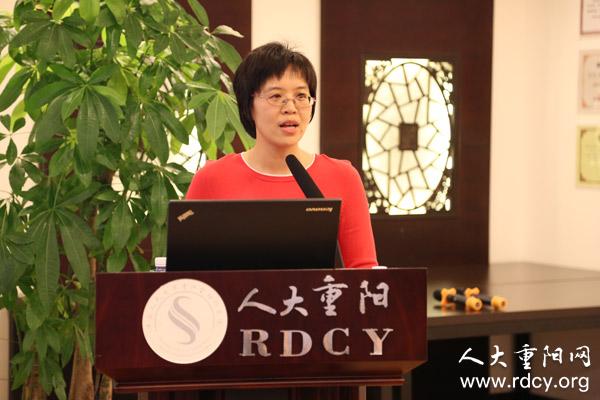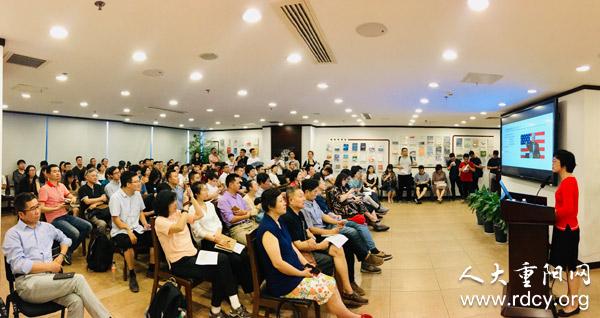Picture
Your Present Location: HOME> PictureFan Xiaoju: Japan's G20 diplomacy and China-Japan future ties
On June 25, Chongyang Institute for Financial Studies of Renmin University of China invited Professor Fan Xiaoju, executive director of the Northeast Asia Research Center of the China Institute of Contemporary International Relations, to conduct an in-depth analysis of "Japan's G20 home diplomacy and the future of China-Japan relations".

Professor Fan first noted her understanding for the current situation and China-Japanese relations. She said that the most important international situation we are facing is the game between China and the United States under the background of trade friction. A trend of trade protectionism appeared in the world. After taking office, US President Trump, under the banner of "America first", launched a trade war against major countries, and now the volume of global trade has shrunk. This kind of US trade hegemonism makes it very difficult for countries to reach an agreement on economic policy and poses a great challenge to the mechanism of G20.
On the other hand, the re-emergency of geopolitics makes the contradictions between countries more prominent, and it is difficult for diversified G20 countries to form a big consensus under this multilateral framework. Another challenge is that the US begins to distrust and support multilateral mechanisms, so that the challenges of the G20 mechanism and global governance are also relatively large.
She said that this year Japanese Senate elections and local elections will be held in the same year. Every time the two elections come together, it is a big test for the ruling party. The Senate elections to be held in July are important for the LDP and Prime Minister Abe. On the whole, there are hidden worries about the economic situation in Japan. This year, against the Sino-US game and trade protectionism emerged, Japan's export data began to decline, leading to a downward expectations in economy. In addition, Japanese diplomacy has encountered some setbacks in several directions.
The G20 presidency has a leading role in setting the social development agenda. Japan embodies its diplomatic and national interests in its agenda setting. The first is issues that reflect Japanese characteristics, such as the ageing and declining birth rate. Because of the serious situation, Japan has the experience and practical needs to cope with this problem. Exchanges and cooperation with other countries on this issue are conducive to promote Japan's leading role..
The second is the topic that has attracted widespread concern from the international community, such as the reduction of marine plastic waste. This is also the highlight of Japan’s G20 summit.
The third is issues that help boost Japan's voice, such as the formulation of investment principles for high-quality infrastructure and the making of rules for the digital economy.
Professor Fan said that Sino-Japanese relations have returned to normal, with several manifestations. First, the exchange of high-level visits has enhanced the political mutual trust between the two sides. The second manifestation is that pragmatic cooperation has strengthened the economic ties between the two countries. During Abe’s visit to China, he brought an economic group of more than 500 people and signed many agreements, including agreement on third-party market cooperation, which has strengthened economic ties between the two countries. The third manifestation is the joint management of crises and sensitive issues.
She said that there are still problems between China and Japan, and the sensitive issues between two countries have not yet been completely resolved. The two core issues, one is the historical and territorial issues and the other is the feelings of the people.
She noted that In the future, if China and Japan are to form a real cooperative relationship, there are several things they should do well. First of all, the cornerstone of cooperation should be peace and reconciliation. The biggest problem between China and Japan is the failure to achieve real reconciliation between the people. Second, the basis of Sino-Japanese cooperation should be respect and mutual trust. Unfortunately Japan's respect for China at the national institutional level is relatively lacking and public opinion in China is also divided with the "Anti-Japanese" and "Pro-Japanese" sentiment. Third, the two sides should recognize their common responsibilities and develop the willingness to cooperate.

She added that China and Japan, as the two largest countries in East Asia, should have the consciousness to shoulder the responsibility for regional peace and prosperity. Especially in the current international context, it is of far-reaching significance for the common interests of the two countries and the region to strengthen cooperation, develop long-term peace and cooperation, and achieve real reconciliation. Therefore, in terms of willingness to cooperate, it is necessary to reach a consensus in both countries, not just high-level interaction, so that two countries can really move towards mutual cooperation.























































































 京公网安备 11010802037854号
京公网安备 11010802037854号





